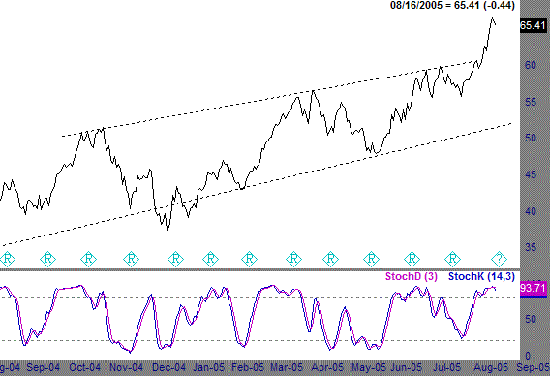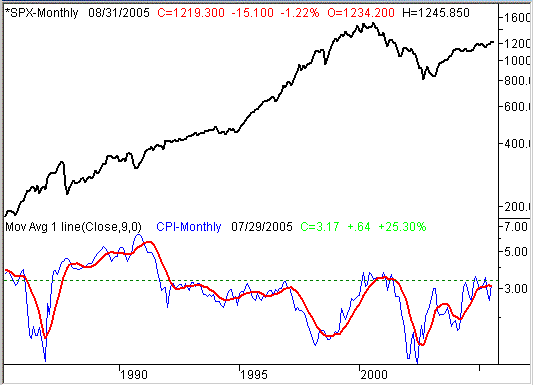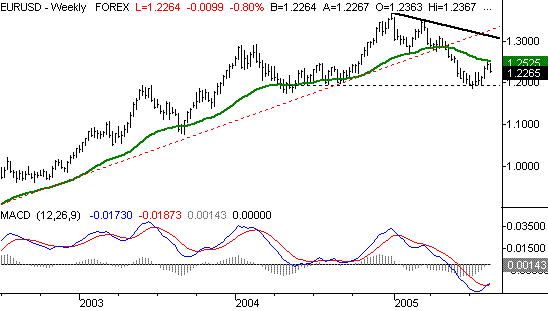We've got a handful of things we want to look at today, including oil, inflation, and the U.S. dollar.
Oil - Down, But Not Out
Yesterday, crude oil prices fell back under the $65 mark. You'd have to be on the moon not to have heard it (and even then, you still may have heard it). What's interesting, though, was the news behind the move. Commodities traders and market junkies probably know this, but the casual trader may not.....oil inventories (supply) were actually down, while demand (at the gas pumps anyway) was still increasing. Now, think back to basic economics. If supply is down and/or demand is up, then prices increase, right? Well, normally, yeah.
What went wrong with yesterday? The Department of Energy said U.S. gasoline inventories dropped by 5 million barrels (that's a lot more than analysts had expected). Crude inventories were up by 300,000 barrels. Up is up, but that addition is also less than what was expected. Demand for gasoline is 1.5 percent higher than it was a year ago.
So why the screwy pricing? I submit two possibilities. First, it's largely evidence that hype and hysteria (a.k.a. greed and fear) are as much of a factor as supply and demand. In this particular case, traders were looking for any excuse to take big profits on crude's run to $67. Never mind that fact the rationale for profit-taking was completely backwards - once a selloff starts, that's the only reality that matters. The second possibility is this......it's an error. That's not to say the prices were reported incorrectly. We're posing the possibility that the decisions made yesterday were incorrect, and that oil prices still haven't seen the highs they're going to. Can it happen? Oh yeah. Just look back to October of last year and March of this year. Each time oil sold off then, it came back - and then some!
The recent highs near $67 were a little much, to be sure. Crude oil futures had been in a pretty wide zone for months, but were generally pointed higher. They broke above that resistance in July, and became sharply overbought. Period. We're not surprised to see oil rolling over now....but we're not giving up on our longer-term oil stocks either.
Crude Oil Prices - Daily

Inflation - Still Irrelevant, After All These Years?
In Tuesday's TrendWatch we first posed the idea that inflation has historically proven to be irrelevant to how stocks perform. Many would argue against that notion, which is fine. We just ask that you show us how inflation consistently pushes the market around. Our research shows no correlation.
The reason we're bringing it up again is because the news media threw in the inflation data with the oil price stories. Granted, there are some commonalities. Oil prices are part of the Produce Price Index (or PPI), so higher oil prices can inflate the PPI number. The Labor Department reported that the Producer Price Index increased by 1 percent in July. Frankly, that's quite a bit. The Consumer Price Index (CPI), reported on Tuesday, showed a 0.5 percent increase (which translates into an annual rate of 3.17 percent). That figure is also substantial.
All the same, we still can't see the direct or immediate effect on stocks. High inflation is supposed to be a burden on corporate profitability, and it probably is. But, there's a flaw in that line of thinking. The current inflation rate may or may not lead to current profit or losses, and the current degree of profitability for a company is rarely reflected in its current stock price. In other words, the timing is all wrong. By the time we have all the data, we're either well past the effects of it, or we're well in front of it. To say it another way, there's a lack of synchronization. High inflation has never been a valid reason to not own stocks. Conversely, low inflation has never been a reason to own stocks. We'll re-insert Tuesday's image below, just to remind you.
S&P 500 versus Consumer Price Index (CPI) - Monthly

The U.S. Dollar
We know some of you were betting against the dollar, anticipating that its recent improvement was only temporary. Not that we have the corner on currency trading, but we disagreed. We saw the dollar's long-term demise finally coming to an end. We still do.
The last time we looked at the dollar was on July 19th. At the time, the dollar had been on a roll for about 10 weeks, and was due for a break. That's exactly what we got, but it wasn't anything more than a break from a bigger-picture recovery. We were planning on the dollar/yen exchange to fall to 1.08, and we thought we could see the euro/dollar conversion climb to 1.25. After that, though, the dollar would be back on track.
That's basically what happened. After being reeled in to more tolerable levels, the dollar is back on the mend. We're still looking for the sawbuck to gain. Based on the last leg of the recovery, the dollar/yen exchange rate could move as high as 118. The euro/dollar ratio could fall to 1.10. We'll see.
Euro versus Dollar - Weekly

Price Headley is the founder and chief analyst of BigTrends.com.